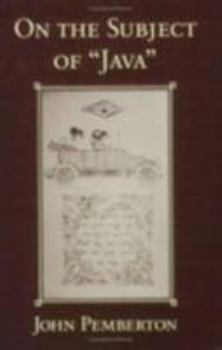On the Subject of Java
Select Format
Select Condition 
Book Overview
What are the limits of cultural critique? What are the horizons? What are the political implications? John Pemberton explores these questions in this far-reaching ethnographic and historical interpretation of cultural discourse in Indonesia since 1965. Pemberton considers in particular how the appearance of order under Soeharto's repressive New Order regime is an effect of an enigmatic politics founded upon routine appeals to cultural values. Through a richly textured ethnographic account of events ranging from national elections to weddings, Pemberton simultaneously elucidates and disturbs the contours of the New Order cultural imaginary. He pursues the fugitive signs of circumstances that might resist the powers of New Order rule through unexpected village practices, among graveyard spirits, and within ascetic refuges. Key to this study is a reexamination of the historical conditions under which a discourse of culture emerges. Providing a close reading of a number of Central Javanese manuscripts from the late eighteenth century on, Pemberton outlines the conditions of knowledge formation in Indonesia since the beginning of Dutch colonial control. As he overturns common assumptions concerning colonial encounters, he discloses the gradual emergence in these texts of a discursive figure inscribed in contrast to the increasingly invasive presence of the Dutch: a figuration of difference that came to be called "Java."
Format:Paperback
Language:English
ISBN:0801499631
ISBN13:9780801499630
Release Date:December 1994
Publisher:Cornell University Press
Length:320 Pages
Weight:1.15 lbs.
Dimensions:0.9" x 6.1" x 9.0"
Age Range:18 years and up
Grade Range:Postsecondary and higher
Customer Reviews
1 rating
Good history, decent to poor ethnography
Published by Thriftbooks.com User , 24 years ago
Very readable and relevant not only to academic anthropologists but anyone interested in Indonesian history. Pemberton extends Hobsbawn's notion of "invented traditions" to show how Soeharto's new order has constructed Java and greater Indonesia according to his nationalist agenda. Pemberton's overall argument is argued more or less cogently. However, a problem emerges as he endeavors to depict Java and its traditions as a construct. Namely, Pemberton has a tendency to lump all Javanese experience together, assuming that individuals of different backgrounds all share the same understading of Java and its traditions. Pemberton ultimately overestimates the extent of the political center's power over all Javanese. As a result, this makes for good history but is not thorough enough in its approach and is to generalizing to be considered a good ethnography.






